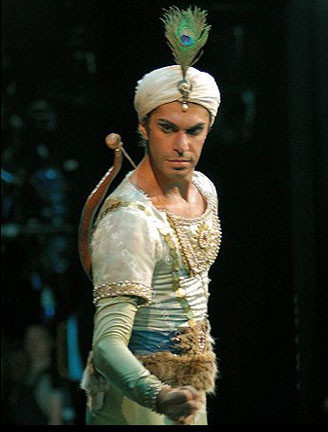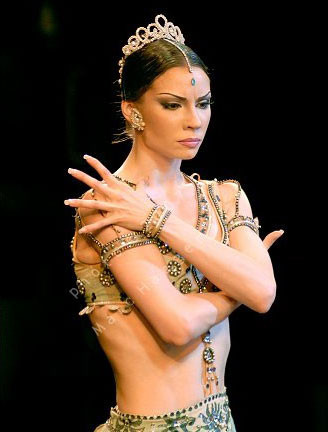|
19 July 2019 (Fri), 19:00 Russian National Ballet Theatre - Classical Ballet "La Bayadere"

Running time: 2 hours 30 minutes (till 21:00)
The performance has 1 intermission
Schedule for "La Bayadere" 2022
Composer: Ludwig Minkus
Choreography: Marius Petipa
Orchestra: Symphony orchestra of the Summer Ballet Seasons
Classical Ballet in 2 act
A wonderful ballet originally staged in four acts and seven tableaux by French choreographer Marius Petipa to the music of Ludwig Minkus.
The famous French choreographer Marius Petipa at the end of the 19th century created the ballet La Bayadere. It tells the tragic love story of a dancer and a warrior, based on an ancient Indian legend. In those days, the East was in fashion: artists, poets and composers often turned to exotic subjects in search of inspiration.
The music for the ballet La Bayadere was written by the Czech composer Ludwig Minkus, who worked a lot in Russia.
At the end of the 19 th century a famous French choreographer Marius Petipa ( He was called Marius Ivanovich in Saint Petersburg) created the ballet "La Bayadère". It tells a tragic love story of a dancer and a warrior, based on an ancient Indian legend.
In those days, Oriental topic was popular: artists, poets and composers were looking for the inspiration in exotic subjects. The music to the ballet was composed by Ludwig Minkus, a Czech composer who worked a lot in Russia. (For the convenience, he was given the Russian patronymic - Fyodorovich and was called Ludwig Fyodorovich).
In 1877, the result of Marius Ivanovich and Ludwig Fyodorovich's work was presented to sophisticated St. Petersburg's audience. The audience was delighted by the beautiful music and complicated choreography, luxurious costumes and amazing scenery, fascinating plot, vivid characters and a bit of magic. After the first night, the ballet was staged a lot in Russia and abroad and became one of the
most popular performances.
Synopsis
Act I
Scene 1
Guests come to the New Year party. Drosselmeier, Masha’s godfather, has prepared wonderful presents for children, including a funny Nutcracker doll. The children are eagerly waiting for the moment when they are shown the Christmas tree and the holiday presents. The desired moment finally comes: they see the decorated Christmas tree sparkling with lights.
Drosselmeier appears disguised as a magician and entertains the children with tricks. His ability to animate toys astonishes the children. Masha likes the awkward, funny Nutcracker a lot, and Drosselmeier gives the toy to the girl.
Playing with the Nutcracker, children accidentally break it. Masha is very upset. Drosselmeier, with the help of magic, repairs the doll and calms Masha down. Gradually the party comes to an end, the guests leave, and the room is empty. Masha, taking a candlestick, creeps up to the tree to have one more look at her favorite toy before going to sleep, and, making sure that the Nutcracker is in his place, the girl plunges into the world of dreams and gradually falls asleep.
Scene 2
On New Year's Eve Masha has a magic dream. She suddenly faces a large mouse army led by the Mouse King. The Nutcracker and toy soldiers bravely protect her, but the forces are not equal. The mice capture the dolls. Taking a magic candlestick, Masha throws it at the mice. The army runs away.
The Nutcracker who is lying on the floor suddenly turns into a handsome Prince. He leads Masha into a fairy, enchanted forest, where the magnificent winter reigns, the snowy whirlwinds swirl, the snowflakes turn around and sparkle. They pick up Masha and the Nutcracker Prince and carry them away, dancing and taking them farther and farther into the snowy forest wilderness.
Suddenly Masha and the Prince see a wonderful rook, get aboard and go to the amazing magic land of Confitureurburg.
Act II
Scene 3
Masha and the Nutcracker Prince are in the domain of the Mouse King. The captive dolls languish and suffer. Having entered the struggle with the mice and having defeated their king, the Prince and Masha release the captive dolls and sail together with them for a holiday in the sweet city of Confiturenburg. A lot of dolls from different countries come to the festive ball. They perform Russian, Oriental, Spanish, Chinese and other dances. The festival ends with the waltz of flowers.
Waking up, Masha realizes that it was just a dream...
Synopsis
Act I
Young warriors led by Solor are hunting a tiger. Before entering the forest Solor asks a fakir, named Magedavia, to tell Nikia, a bayadere, that he will wait for her near the temple.
The High Brahmin and priests are solemnly leaving the temple. The feast of worshipping fire begins. Fakirs and votaries of the temple, bayaderes, are performing sacred dances. Beautiful Nikia is among them. She adorns the festival.
Having forgotten about his ordination and vow of celibacy, the High Brahmin tells Nikia that he loves her and promises to place at her feet all the riches of India. Nikia rejects his wooing. She will never love him.
Nikia and other bayaderes give the fakirs water from the sacred pool. Imperceptibly Magedavia tells Nikia that Solor will come to see her. The bayadere is happy.
It is getting dark. Nikia comes to meet her beloved. Their secret rendezvous is guarded by the fakir. But the High Brahmin manages to overhear the conversation of the sweethearts.
Solor proposes that they elope. The bayadere agrees, but first she wants him to vow fidelity to her at the sacred fire. Solor takes the oath. The High Brahmin is infuriated. He appeals to the gods and demands punishment. His revenge will be terrible.
Next morning the rajah Dugmanta, head of the principality, tells his daughter Gamzatti that she will see her fiance that day.
The rajah sends for the fiance. It is the brave warrior Solor. The rajah shows Solor his beautiful daughter and proclaims them bride and groom. The warrior is struck by Gamzatti’s beauty. But he remembers the bayadere, his vow to her, and is thrown into confusion.
It is time to hold the ceremony of consecrating Gamzatti’s betrothal. Nikia is invited to the palace for the ceremony.
The High Brahmin arrives. He wants to tell the rajah a secret. Dugmanta sends everybody away. Gamzatti feels that the High Brahmin’s arrival is somehow connected with her forthcoming marriage and eavesdrops on the Brahmin’s conversation with her father.
The High Brahmin tells the rajah about Solor’s love for Nikia. Dugmanta is infuriated but doesn’t change his mind to give his daughter in marriage to Solor. The bayadere, who made Solor take the oath, must die.The High Brahmin who had wanted to get rid of his rival, didn’t expect such a turn of events.
He threatens the rajah with punishment of the Gods for the bayadere’s death. But the rajah is unrelenting.
Gamzatti orders her slave to bring Nikia. She sees that the bayadere is very beautiful and can be a dangerous rival. The rajah’s daughter tells the bayadere about her forthcoming marriage and invites her to dance at the feast. She deliberately shows her the portrait of her fiance Solor. Nikia protests: Solor loves only her and he made a vow of eternal fidelity. The rajah’s daughter demands that Nikia should give up Solor. But the bayadere would rather die than part with Solor. Gamzatti offers her jewels. Nikia throws them away with scorn. Nothing will make her part with her beloved. She raises her dagger in a rage. The slave stops her. But Gamzatti will never give her fiance back.
Act II
A sumptuous feast is being held on the occasion of Solor and Gamzatti’s engagement. The bayadere Nikia is supposed to entertain the guests with dances. She can’t hide her grief. Her eyes are fixed on her beloved Solor.
The fakir presents Nikia with a basket of flowers on behalf of Solor. The bayadere’s dance is filled with happiness. But suddenly a snake crawls out of the flowers and bites her fatally.
Nikia realizes that the rajah’s daughter is to blame for her death. The High Brahmin promises to save her life if she will love him. But the bayadere is faithful to her love for Solor. Nikia dies. Solor leaves the feast in despair.
Act III
Solor is inconsolable. He is gnawed by remorse. He enjoins the fakir to distract him from his grievous thoughts. Fascinated by the sacred dance, Solor sinks into the world of dreams.
Shadows appear to him out of the darkness. They are descending from mountains in a long file. Solor sees fair Nikia among them…
Solor comes out of his dazed state and hurries to the temple. He prays to the gods to forgive him. But it’s too late. The infuriated gods punish Solor for his betrayal of love. Lightning and thunder destroy the temple. There is no more reality for Solor. He follows the shadow of fair Nikia…






Schedule for "La Bayadere" 2022
     
| 


